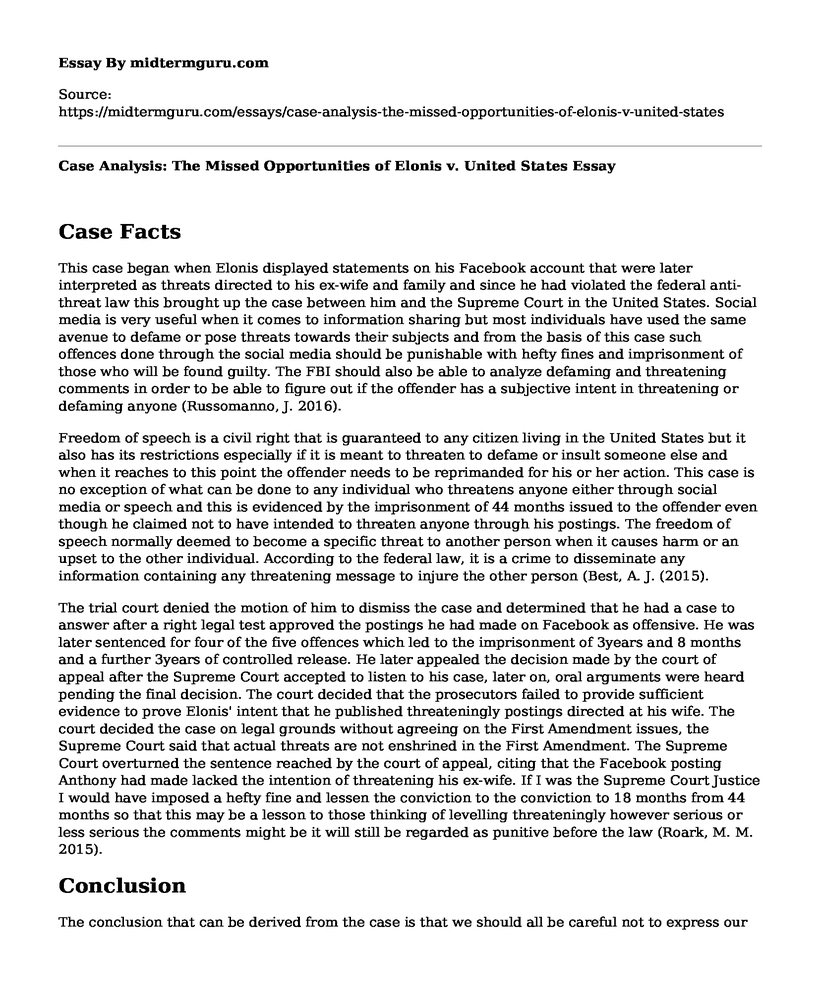Case Facts
This case began when Elonis displayed statements on his Facebook account that were later interpreted as threats directed to his ex-wife and family and since he had violated the federal anti-threat law this brought up the case between him and the Supreme Court in the United States. Social media is very useful when it comes to information sharing but most individuals have used the same avenue to defame or pose threats towards their subjects and from the basis of this case such offences done through the social media should be punishable with hefty fines and imprisonment of those who will be found guilty. The FBI should also be able to analyze defaming and threatening comments in order to be able to figure out if the offender has a subjective intent in threatening or defaming anyone (Russomanno, J. 2016).
Freedom of speech is a civil right that is guaranteed to any citizen living in the United States but it also has its restrictions especially if it is meant to threaten to defame or insult someone else and when it reaches to this point the offender needs to be reprimanded for his or her action. This case is no exception of what can be done to any individual who threatens anyone either through social media or speech and this is evidenced by the imprisonment of 44 months issued to the offender even though he claimed not to have intended to threaten anyone through his postings. The freedom of speech normally deemed to become a specific threat to another person when it causes harm or an upset to the other individual. According to the federal law, it is a crime to disseminate any information containing any threatening message to injure the other person (Best, A. J. (2015).
The trial court denied the motion of him to dismiss the case and determined that he had a case to answer after a right legal test approved the postings he had made on Facebook as offensive. He was later sentenced for four of the five offences which led to the imprisonment of 3years and 8 months and a further 3years of controlled release. He later appealed the decision made by the court of appeal after the Supreme Court accepted to listen to his case, later on, oral arguments were heard pending the final decision. The court decided that the prosecutors failed to provide sufficient evidence to prove Elonis' intent that he published threateningly postings directed at his wife. The court decided the case on legal grounds without agreeing on the First Amendment issues, the Supreme Court said that actual threats are not enshrined in the First Amendment. The Supreme Court overturned the sentence reached by the court of appeal, citing that the Facebook posting Anthony had made lacked the intention of threatening his ex-wife. If I was the Supreme Court Justice I would have imposed a hefty fine and lessen the conviction to the conviction to 18 months from 44 months so that this may be a lesson to those thinking of levelling threateningly however serious or less serious the comments might be it will still be regarded as punitive before the law (Roark, M. M. 2015).
Conclusion
The conclusion that can be derived from the case is that we should all be careful not to express our emotions through social media or speech. The case should have been decided on constitutional grounds in tandem with the First Amendment dictates. Finally the Supreme Court shouldn't have overturned the conviction but in turn, they would have lessened the sentence and impose a hefty fine to caution anyone intending to do violate freedom of speech that serious actions will is taken on them.
References
Russomanno, J. (2016). Facebook Threats: The Missed Opportunities of Elonis v. United States. Communication Law and Policy, 21(1), 1-37.
Roark, M. M. (2015). Elonis v. United States: The Doctrine of True Threats: Protecting Our Ever-Shrinking First Amendment Rights in the New Era of Communication. Pittsburgh Journal of Technology Law and Policy, 15(2), 197-223.
Best, A. J. (2015). Elonis v. United States: The Need to Uphold Individual Rights to Free Speech While Protecting Victims of Online True Threats. Md. L. Rev., 75, 1127.
Cite this page
Case Analysis: The Missed Opportunities of Elonis v. United States. (2022, Oct 05). Retrieved from https://midtermguru.com/essays/case-analysis-the-missed-opportunities-of-elonis-v-united-states
If you are the original author of this essay and no longer wish to have it published on the midtermguru.com website, please click below to request its removal:
- Essay on Sleepy Lagoon Murder Case
- Juvenile Crime Rate Paper Example
- Essay Sample on Equity, Justice and Human Dignity
- Research Paper on Recidivism
- Crime Scene Investigator Analysis of Simm's Case - Essay Sample
- 'Superpower' and 'Empire' - Essay Sample
- Internships in Criminal Justice: An Essential Part of Education - Essay Sample







